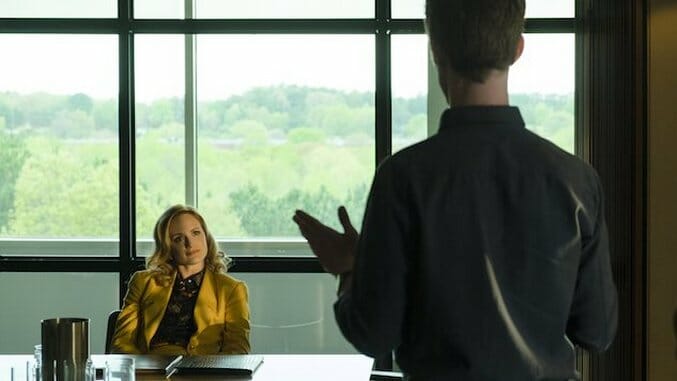Halt and Catch Fire: I Drink Your Smoothie
(Episodes 4.01 and 4.02)
Photo: Gene Page/AMC
The opening sequence of Halt and Catch Fire’s fourth season is sure to attract the lion’s share of attention, but it’s our first meeting with Donna (Kerry Bishé) that suggests the series’ true art. Or, to be precise, our first meeting with one of multiple Donnas: This is the woman of the IPO vote, calm and decisive and possibly heartless, not the shattered figure of that now long-ago morning when Mutiny sunk like a stone. When she sits, she does so suavely—a motion so smooth it’s rather unsettling, as if she’d appeared out of thin air. When she waves away a man’s laptop, she does so efficiently—it’s more the idea of a gesture than the genuine artifact, not one muscle twitch of waste. And when she defunds the developers before her, the camera gliding toward her tranquil face, she does so politely—so politely, in fact, that they thank her for the honor of their own demise. She returns to her office and sips from the second glass her assistant prepared for her, as the former developers of her web browser, Millennium, fight it out in the corridor. And when she sips, she does so contentedly—she needn’t say a word to recall another message of control. I drink your smoothie, I imagine her thinking. I drink it up!
(Fine, it’s juice. Just go with it.)
In Halt and Catch Fire’s two-hour premiere, control—the desire for it, the assertion of it, its maintenance, its loss—is at once a central theme and an aesthetic through line; aside from the multi-storied, Birdman-esque beginning, strung so taut across the years that it finally starts to fray, both episodes are models of poise equal to Donna’s own. In the first hour alone, three subsequent sequences elaborate on her composure: the superb montage, set to Hole’s “Doll Parts,” which contrasts Donna and Cameron (Mackenzie Davis), still best of enemies; their face-to-face meeting in Gordon’s (Scoot McNairy) living room, which underscores their differences yet again; and her return to the conference room near episode’s end, calm and decisive and definitely heartless. It’s the last of these on which the narrative turns—after Gordon relates Joe’s (Lee Pace) idea for “a website of websites,” Donna tasks a new team of developers with bringing the stolen idea to fruition—and yet the brutal truth of the scene—that Donna’s ambition outstrips her compassion, even for those with whom she was once closest—depends on the foundation poured earlier in the episode. The lingering image of her silhouette in the door, as the man she beds slips off his blazer; the sharp differences between Donna, perfectly coiffed and dressed to the nines, and Cameron, hungover in her pajamas; Courtney Love’s promise of comeuppance, “And someday, you will ache like I ache”: These are the materials from which Christopher Cantwell and
Christopher C. Rogers built one of the best shows on television, their mortar and their brick.
But I digress.
Here are the facts:
1. Three years have passed since the events of the Season Three finale. In that time, Gordon and Joe “built the power company,” but their browser, like Donna’s, is losing out to Mosaic with consumers. AOL is targeting their company, Lodestar, for acquisition, as part of its plan to defeat Compuserve and Prodigy. (That is, until MCI’s interest in entering the market threatens to put Lodestar out of business.) Gordon and Joe are restless.
2. Cameron’s created an immersive, complex fantasy game that’s DOA, after it gets trashed by a bunch of Mortal Kombat-loving youngsters in a focus group. She’s back from Tokyo, where she went AWOL during the development of Lodestar to try to save her marriage after sleeping with Joe last season. Tom has left her for another woman. She, too, is restless.
-

-

-

-

-

-

-

-

-

-

-

-

-

-

-

-

-

-

-

-

-

-

-

-

-

-

-

-

-

-

-

-

-

-

-

-

-

-

-

-








































